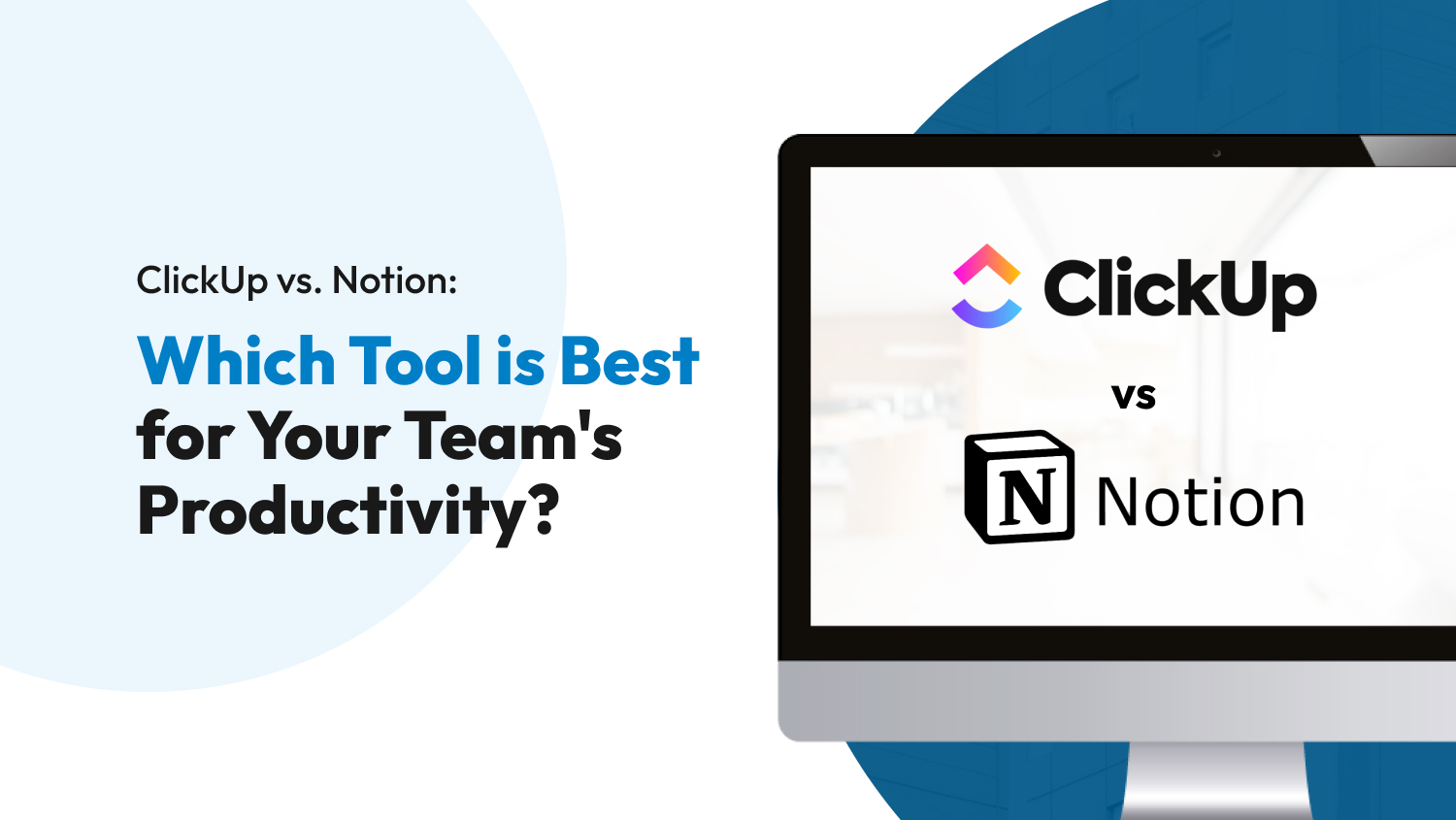Project Management
ClickUp vs. Notion: Which Tool is Best for Your Team’s Productivity?
How well a team works together can impact a business’s daily operations and long-term success. Improve the team you have today by integrating the right productivity tool. It streamlines teams’ workflows, allowing members to do more without spending more resources.
There are plenty of ways to improve your team’s productivity — and using the right tool is one. These tools provide all-in-one solutions making it easier for teams to manage projects, collaborate with others, track time, and customize workflows.
ClickUp and Notion claim that they’re the best productivity tool, aimed to replace a variety of apps. But which of the two delivers that promise better? These cloud-based software platforms offer similar features but actually have significant differences.
In this article, we’ll examine ClickUp and Notion more closely to see how they compare in terms of different features. Let this article help you in choosing which tool best fits your team.
ClickUp and Notion Compared
ClickUp brings together docs, wikis, lists, spreadsheets, chats, and many others. It’s almost infinitely customizable, allowing you to configure almost anything — from fields and filters to views and dashboards. Although its interface feels a bit cluttered, it’s reasonably intuitive and can boost productivity after some getting used to it.
From a note-taking tool, Notion definitely has come a long way. It comes with helpful tutorials covering various topics, including making a blog and creating a website with Notion as a content management system. Notion has limited features but makes up for it by offering a simpler, cleaner interface to its users.
ClickUp Vs. Notion: Comparing Features
To learn more about ClickUp and Notion, it’s crucial to dive into a detailed comparison. This section will discuss how these two tools weigh up in terms of:
- Built-in Automation
- Collaboration and Communication
- Customer Support
- Ease of Use
- Knowledge Base and Learning
- Integrations
- Pricing
Built-in Automation
Automation helps teams to do more and save time. In fact, automating business processes is key to a business’s growth and sustainability.
ClickUp has built-in automation tools, meaning users can save tons of resources completing repeated or mundane tasks. With ClickUp’s intelligent automation, you can automatically assign tasks to people and change the status when the due date arrives, and more.
Notion doesn’t have any built-in automation tools, which is a big con for many marketers and business owners. Because of this, you’ll need to use third-party tools to automate tasks.
The winner: ClickUp wins this round because it saves teams the time and effort of integrating and learning third-party tools.

Collaboration and Communication
For a team to work effectively, members must collaborate and communicate with each other. Embracing a collaborative culture fuels trust, while communication fosters an open and diverse work environment. Fortunately, both platforms offer tools for collaboration and communication.
ClickUp has several collaborative features, such as Whiteboard, Proofing, chats, and emails. These features allow teams to leave comments on tasks, mention other team members, and exchange emails directly within ClickUp.
One of ClickUp’s most unique features is its Whiteboards. With this, you can brainstorm and share ideas on a visual canvas — just like how a real whiteboard works! It has a chat option where you can communicate with anyone in real time.
Notion doesn’t disappoint when it comes to collaboration tools. For starters, the platform allows you and other team members to edit the same page at the same time. The profile pictures of the users also show you where they’re working or looking on the page. Any comments and edits made by anyone will appear to you instantly.
As for communicating inside Notion, you have several options. You can mention team members by typing “@” followed by their names anywhere on the page. You can also leave comments on a page or add one on an image, embedded, or any type of block.
The winner: This round is a tie because both platforms offer excellent collaboration and communication features. ClickUp’s best features are its live chat and Whiteboards, while Notion lets users view and edit the same page simultaneously.
Customer Support
Having access to customer support expedites your team’s ability to adapt to a new tool. It also lessens downtime as issues are addressed as soon as possible.
ClickUp’s customer support is available 24/7, meaning you can contact them any time of the day, any day of the week. Their lines are also open during holidays. They also offer different communication channels, like calls, chats, and emails. You can also access their customer support through the platform’s Priority Support option, a feature available on all plans except for the Personal Plan.
If you need to get in touch with a customer support rep from Notion, you can do so in many ways. You can reach out to them via email, chat, or even Twitter.
The winner: ClickUp and Notion’s customer support are responsive, but ClickUp has the upper hand as theirs is available 24/7.
Ease of Use
The simplicity of the tool is important, especially when the majority of the team members aren’t tech-savvy. The simpler the tool is, the easier it is for them to adapt.
Because of the number of its features and configurations, ClickUp is often confusing for first-time users. It has a nice interface, but its options make users feel overwhelmed.
Notion has a simple structure and interface and has organized blocks and sections to make it easier for users to navigate the tool. Moreover, Notion has fewer options, which means that users don’t have to jump through hoops to accomplish a task.
The winner: The simplicity of Notion earned the tool its win in this category.
Knowledge Base and Learning
Teams need all the help they can get to adjust to a new tool fast. Besides having access to customer support, ClickUp and Notion have communities where new users can ask for help from experienced users.
ClickUp has an active community where you can ask questions about the challenges you’re facing while using the platform. Its knowledge base also contains different learning resources, like webinars, help articles, and case studies.
Additionally, ClickUp has ClickUp University, the platform’s learning academy. Here, you can access a collection of in-depth tutorials and courses related to ClickUp and productivity. Want to catch the attention of recruiters online? Earn ClickUp certificates and share them on social media platforms like LinkedIn.
Notion has a vibrant community forum where new users can comfortably ask questions about the platform. You can even join Notion groups around your area and get to know members by attending lunch gatherings or coffee meetups.
Notion’s knowledge base is an excellent feature, as you can search for answers to your questions. Type in any query you have — whether it may be about using certain tools or finding a specific feature on the dashboard — and you can easily find answers, as Notion’s knowledge base has hundreds of help articles and webinars.
The winner: Because both platforms offer extensive and easy-to-access community forums and knowledge bases, we declare this round a tie. This feature makes it easier for users to navigate the tool if they don’t have the time to wait for a live agent.
Integrations
In most cases, the features offered by a productivity tool aren’t enough for teams. You’ll likely have to use other tools alongside the productivity tool to achieve the best results.
ClickUp has native integration with over 50 third-party apps, including Webhooks, Google Drive, Microsoft Teams, Zendesk, and Loom. You can also integrate the tool with Zapier, which then allows you to connect with more than 1,000 apps.
Notion integrates with over 30 third-party apps to help teams work efficiently and without any interruptions. Notion seamlessly integrates with a wide array of tools, like Dropbox, Figma, GitHub, and Zoom.
The winner: ClickUp wins this round because of the number of integrations it supports.
Pricing
Cost is always an important deciding factor when choosing a project management tool. Investing in a tool that’s too expensive can adversely affect other aspects of the business.
ClickUp and Notion are pretty fair in terms of their pricing — their plans are relatively cheap. And because platforms offer different plans (ClickUp has five and Notion has four), you can choose one that best fits your budget and your team’s needs.
| ClickUp | Plan | Notion | Plan |
| Free Forever | $0 | Personal / Free | $0 |
| Unlimited | $5 | Personal Pro | $5 |
| Business | $12 | Team | $8 |
| Business Plus | $19 | Enterprise | For more streamlined pricing, contact Notion sales team |
| Enterprise | Custom-made, requires users to contact customer support |
The winner: Notion because it offers an excellent plan for personal use and different monthly plans packed with features, perfect for teams.

Summary
Don’t have time to go through each section to determine which tool beats the other? We’ve prepared a table below to help you compare ClickUp and Notion side by side:
| Feature | ClickUp | Notion |
| Built-in Automation | 🏆 | |
| Collaboration and Communication | 🏆 | |
| Customer Support | 🏆 | |
| Ease of Use | 🏆 | |
| Knowledge Base and Learning | 🏆 | 🏆 |
| Integrations | 🏆 | |
| Pricing | 🏆 |
ClickUp vs Notion: Is There a Winner?
There is no definitive answer when you compare ClickUp and Notion. Businesses use them for different reasons, and the best for yours depends on your preferences, requirements, and goals.
ClickUp is an excellent choice for teams looking for a flexible and powerful tool and is willing to invest time and effort to configure it. Notion might be a better option for teams who want to organize and access projects and notes in one place.








